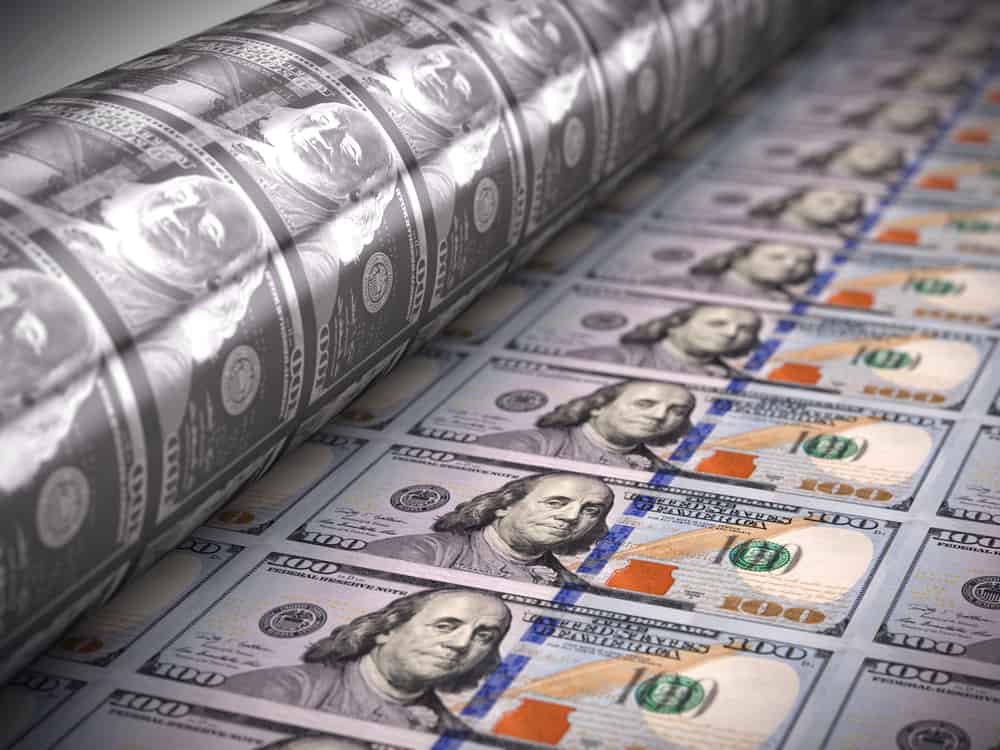With Trillions of Dollars Being Pumped into the Economy, Bitcoin Is Bound to Be Affected

Author: Maria Andretti
Last Updated: 18 May 2020
To help Americans, the Federal Reserve is printing money and cutting interest rates. The question many are asking is, “will these moves have an impact on the crypto market?”

Policymakers in the United States and elsewhere have plowed an unprecedented amount of new money into the economy in hopes of staving off what is looking like a recession, or worse, a depression. Late March saw the first stimulus package of $2 trillion. The House of Representatives has recently accepted a new proposal for a further $3 trillion. The additional stimulus package is meant to ease the financial needs of the nearly 15 percent who have lost their job. The Fed has undertaken a wave of quantitative easing of a magnitude never seen before.
Since mid-March, the Federal Reserve has bought up about $2.8 trillion worth of assets. In the aftermath of the 2008 financial crisis, the Fed intervened as well, but limited its asset purchases to Treasury bonds. The crisis brought on by the COVID-19 crisis has prompted the Fed to purchase riskier assets, including municipals and corporate bonds.
What Is Ahead for Crypto Investors?
Bailout money is targeted at helping public corporations in hopes of preventing a loss of shareholder value. It is expected this new tranche of dollars will inflate the cost of assets. As the majority of Americans do not own assets, the result for them will be a reduction in personal purchasing power. Beni Hakek, the Chief Executive Officer of LiquidApps, sees an opportunity for Bitcoin to gain acceptance as a hedge against inflation as well as a store of value.
Quantitative Easing Vs. Hardening
In direct contrast to what seems like an unlimited supply of new money being printed, Bitcoin went through its once every four years halving event. This “halving” reduced Bitcoin’s issuance by 50 percent. For those who believe in crypto, this is proof positive of the crypto currency’s status as the hardest money anywhere. The scarcity of Bitcoin is drawing considerable attention from average investors who are justifiably concerned about the potential risk of runaway inflation due to money printing.
The U.S. may very well be the epicenter of the current financial storm, but others are feeling the tremors as well. The recently proposed $3 trillion easing measure has caused other currencies to experience losses in value against the U.S. dollar. The Brazilian real, Mexican peso and South African rand have all dropped by more than 20 percent since the onset of the coronavirus crisis.
The mid-March crash pushed Bitcoin into the place that historically has been filled by gold. Markets may be slowly clawing their way back, but many countries are experiencing a resurgence of the virus. Moving too fast has resulted in a considerable slowdown in their recovery process.
Matti Greenspan, a financial analyst and founder of Quantum Economics, believes Bitcoin will maintain its future value because the supply is limited. He goes on to say Bitcoin acts as a hedge against inflation, the same as precious metals. In the event the creation of so much new money does induce inflation, it is very likely that Bitcoin, along with gold and silver, will hold their value against the dollar.
BWCEvent aspires to share balanced and credible details on cryptocurrency, finance, trading, and stocks. Yet, we refrain from giving financial suggestions, urging users to engage in personal research and meticulous verification.


